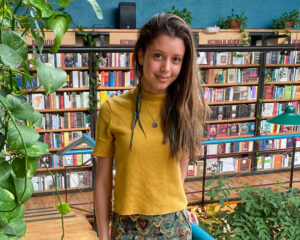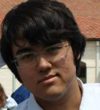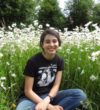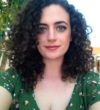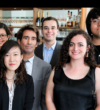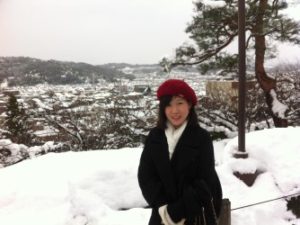
I’m one of those hyphenated Americans. Chinese-American. And I make a journey across the Pacific Ocean at least once a year. All of my extended family still lives in China, one set of grandparents on a farm, and I’m just trying to walk the tightrope between two cultures, East Asian and Euro-American, and not fall off into the abyss of existential crisis. I want to fit in with my friends here, I want to fit in with my cousins in China. When I spent a year abroad in Japan, I wanted to fit in with my friends there, too. That’s probably why, whenever I write, I think of it as a way to try to give a bit of yourself to someone who may not otherwise understand you.
Two years ago, I interned for a Japanese newspaper, Hokkoku Shimbun. Under the heat waves of summer, the journalists and I tramped all over Ishikawa prefecture. They reported, I was hunched over a notepad scrawling in cursive that was half-English, half-Japanese. These would get sculpted into opinion articles, which, in recasting the day’s events from a foreign perspective, would tease out the similarities and differences between East and West.
I remember, once, when I was taken up a mountain to write on the opening of a new nature trail. At the end of a trail overlooking a stream was a wooden pagoda. There was no sound there but the hiss of the stream and occasional belch of a frog, and in the background, trees with branches thin as pencils. The journalist who came with me that day, Tateda-san, stood next to me and asked, did you hear about why they decided to put in this trail? This place used to be known as Suicide Point. Every year, there used to be suicides. The locals had thought that, maybe, by dragging this place out of isolation, they’d discourage people from killing themselves there.
I think that when most Westerners think of the Japanese, they think of a people who write haiku, who drink tea and watch crescent moons from the roof of temples, who were once samurai willing to gut themselves like fish for the sake of their lord. We don’t think as much of the overworked businessman, the rampant bullying that goes on in schools, that there’s a fine levied on the family of anyone who commits suicide by throwing themselves under a train, because it happens too often and upsets the time tables. We don’t think about all those in Tokyo who die what’s called a “solitary death,” where they pass away alone in their apartments and don’t get found until the neighbors notice the smell. There’s a lot about Japan that isn’t a tourist attraction. It’s not like this realization disillusioned me or anything. It actually made me love Japan all the more, because I’d seen its bruises. You can’t really love anything without loving its bruises too.
That’s my philosophy in writing, where I’m always trying to achieve this frank baring of the self. In a lot of the Chinese-American fiction I read, there’s all this folksiness about persimmons being like the sun and grandpa’s Chinese farmer hands. It’s neat, sanitized. But as I’ve come to realize over these four years, you’ve just got to be real. Words fall short sometimes in conveying what you meant for them to convey. But I believe in the power of literature to communicate and make people empathize. That’s why my biggest dream is to work in international publishing. And that’s why I’m currently trying to start this series about the people I know and I come from, Chinese Americans, and tell their story in a no-holding-back, this is the messed-up people we are way.
Sometimes, I think it’s funny. We live in the age of the internet and of over-information, but at the same time, we live just as much in an age of misunderstandings. It isn’t just about global diplomacy and immigration; there’s antagonism between people living in the same United States of America. There are so many things to be written, so many dialogues to be had. If I’ve learned one thing in Creative Writing, it’s that characters don’t have to be likable, they just have to be real, and this in itself will reach out and punch a reader in the gut. These are the characters that I want to write and characters that, as an aspiring editor, I want to guide others to write. What will it take, what will it really take to understand another?
